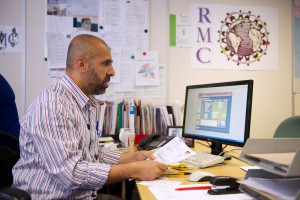translation
In our final l post work of the Refugee and Migrant Centre (RMC) in Wolverhampton, we look at some of the complex social and welfare issues that RMC advisers assist with every day. Some of the names have been changed.
Securing a place at school
RMC helped Rose to complete the application for admitting her child to the local school. It is very difficult for clients with little English to discriminate between very important and less important letters from their child’s school. Rose always brought any letters from school to RMC so that she was sure she fully understood them. When she moved to another area we assisted her in appealing the decision not to allow the child to move schools. Later Rose was obliged to return to her home country for several months and we contacted Wolverhampton Council to inform them that the child would be travelling abroad for a protracted period of time.
Housing debt while coping with cancer
Our client was in debt with rent arrears with their housing provider, who had contracted out collection of the debt to a private company. The debt collectors demanded that he pay each month over the phone. Because the client couldn’t speak English he had to travel to RMC each time so that an adviser could assist him.
He found the journey difficult as he was suffering from cancer, and he was being harassed by the debt collectors knocking on his door continuously. An RMC adviser contacted housing provider and explained the situation. The housing provider retrieved the debt collection from the private company and allowed the client to make payments by direct debit, which was a huge relief to the client.
For the second of our series of short case studies from the Refugee and Migrant Centre (RMC) in Wolverhampton, we find out a bit some more of the challenges that RMC advisers regularly assist with. Some of the names have been changed.
Help with getting citizenship
It is gratifying for Refugee and Migrant Centre staff when their clients finally achieve British citizenship, often at the end of a long, in distance and time, and tortuous journey.
Amira who was from Iraq was applying for citizenship for herself and her children. They all gained citizenship except for one son who was refused because had not passed the ‘Life in the UK’ test.
He was advised by the Government to take the test as soon as possible. However the test costs nearly £900 which the family did not have. RMC were able to support Amira and her son in appealing the decision and after a long wait his citizenship was granted.
Mental health related work
Nora was from Kuwait and seeking asylum in the UK. She had recognised mental health issues and needed support with many aspects of her life.
RMC made GP, hospital and physiotherapy appointments for her and organised interpreting services at these appointments. We located a dentist and booked her an appointment with ‘Healthy Minds’, a psychological therapies service for people who are experiencing common mental health problems such as depression, anxiety and stress.
We liaised with her housing provider re the condition of her accommodation and assisted her in applying for courses at a local college. When she failed to hear the outcome of her asylum interview we contacted her solicitor and the local MP who pursued her case. RMC advisers translated and explained every response so that Nora could better cope with her stressful situation.
Nora is still visiting RMC regularly and still hasn’t heard the outcome of her asylum claim.
In this, the first of a series of short case studies from the Refugee and Migrant Centre (RMC) in Wolverhampton, we learn about some of the challenges faced by RMC clients, and the work that RMC advisers undertake to support them. Some of the names have been changed.
Untangling the web
At stressful times clients need practical and emotional support from the RMC. They may visit weekly or even daily to access that support.
Benita is a refugee from Cameroon. Her children were taken into the care of the local authority following an allegation made by one of her children. RMC made an appointment with a solicitor to represent Benita and accompanied her to her first appointment to help with interpreting.
Benita’s restricted understanding of English meant that she needed RMC to help her to comprehend any communications from social services, the police and her solicitor. Sometimes her access visits to her children were cancelled at short notice and RMC helped her make arrangements to see her children more regularly.
RMC supported her in getting progress reports from her children’s school and in explaining the contents of letters from her solicitor. Benita needed to visit RMC sixteen times in eight weeks. RMC is continuing to support her with the on-going case.
Supporting single mothers
Single mothers are particularly disadvantaged because they have to negotiate their way through many government departments and formal institutions to access their own and their children’s rights whilst caring for those children, and unsupported by a partner.
Dani had had both her Income Support and her Tax Credits application disallowed because of misunderstandings and insufficient evidence on her original application forms. RMC contacted the Job Centre and HMRC to clarify the situation and then supported her in reapplying. Through RMC she accessed Maternity Allowance and food vouchers through the Healthy Start programme.
Dani was registered as self-employed and needed support with completing her tax returns correctly. When problems arose with her child’s attendance at school RMC were able to facilitate meetings so that the issues could be resolved.


